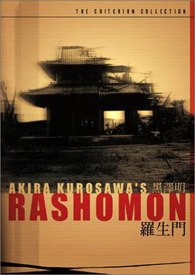

|
| home | movie reviews | features | sov horror | about | forum |
Rashomon A
Year Released: 1950 (USA: 1951)
Rashomon is the film that catapulted Akira Kurosawa into widespread acclaim and recognition around the world, garnering first place at the 1951 Venice Film Festival and later picking up an Academy Award for Best Foreign Language Film. I must admit that though I'd been meaning to see it for years, watching the Criterion Collection DVD was my first time. I'm almost at a loss for words, but I'll give it the old college try. In 11th-century Japan, three men taking shelter from a savage rainstorm under the Rashomon gate discuss a recent murder and recount the conflicting testimonies of those involved. The priest (Minoru Chiaki) is ready to give up all faith in mankind based on what he's heard, while the woodcutter (Takashi Shimura) claims that all the stories are lies. The commoner (Kichijiro Ueda), who wasn't present at the courthouse, doesn't care if it's a lie as long as it's entertaining. So as the rain hammering down outside sets a suitably bleak atmosphere, the woodcutter and the priest relate the stories they heard in the courthouse garden. The one thing that's certain in Rashomon is that a man (Masayuki Mori) was killed in the forest. He may have been murdered by the crazed bandit (Toshiro Mifune) who raped his wife (Machiko Kyo), but her version of the story differs greatly from that of the bandit, who has no qualms about claiming that he raped the woman and then killed the man in a duel. The dead man even has his say about the events leading up to his death (through a medium), but a final word on the events by an impartial bystander negates nearly everything that's been said. We're not sure we can trust any of the four different versions of the story, but that's no matter. Discovering the truth isn't the point. But even if you're not into pondering the film's philosophical ideas about mankind's inability to be truthful (especially to themselves) and the relative subjectivity of truth, Rashomon is riveting simply as entertainment. During its 88-minute running time, the same story (and yet not the same story) plays out four times, but it never becomes dull or repetitious. Quite the contrary: the more the story is shown with minor and major differences, the more compelling it becomes. Toshiro Mifune as the bandit is nothing less than captivating. A cool, collected look in his eyes can suddenly give way to a flicker of insanity, and his frequent crazed laugh is oddly unsettling. And while Masayuki Mori is good as the doomed man, it's Machiko Kyo as his wife who puts forth the film's most amazing performance. Depending on which version of the story is being related, she can be a helpless victim, an icy seductress, or somewhere in between. Through it all, she never hits a wrong note and frequently astounds. Likewise, the black and white cinematography is stylish and beautiful. Watch as the camera weaves through the forest following the woodcutter on the walk in which he discovers the dead man's body. At times, the camera points upward, catching glimpses of the sun through the treetops, then cuts back to woodcutter, ax resting on his shoulder, as he ambles through the woods. This sequence is a marvel of mood and style, making a simple sequence of a guy walking through the forest engaging. The Criterion Collection DVD finally gives this masterpiece the deluxe treatment it richly deserves. The high-definition digital transfer looks and sounds great, while the commentary by Japanese-film historian Donald Richie serves as a nice supplement. There's also a video introduction by Robert Altman, the theatrical trailer, and excerpts from a documentary about Rashomon's cinematographer called The World of Kazuo Miyagawa. The film is presented full screen (in its 1.33:1 theatrical aspect ratio) with monaural audio and optional English subtitles or an English-dubbed soundtrack. The DVD booklet contains linear notes by Stephen Price (author of The Warrior's Camera: The Cinema of Akira Kurosawa), an excerpt from Kurosawa's book Something Like An Autobiography (a fun and informative read), and reprints of the short stories (Ryunosuke Akutagawa's "In a Grove" and "Rashomon") upon which the film is based. I honestly can't think of a way this wonderful package could have been improved upon. For any film buff, this DVD is essential. It's tough to collect my thoughts about Rashomon after just one viewing. I hope I managed to do it an inkling of justice in my review, though I'm sure otherwise. Seeing a film like this once is merely skimming the surface, and there will certainly be more viewings for me in the near future. It asks so many great questions about human nature, but doesn't pretend to have the answers. After all, as much as we know about human psychology, the human mind is still a mystery we'll never fully unravel. Review published 03.27.2002. Follow Michael Scrutchin on Twitter or Letterboxd.
|

|
| home | movie reviews | features | sov horror | about | forum |
| This site was previously at flipsidemovies.com from 2000 to 2008. |
|
contact | copyright | privacy | links | sitemap
Flipside Movie Emporium (FlipsideArchive.com)
|